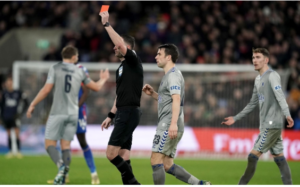An independent regulatory body declared that the refereeing of Everton’s Dominic Calvert-Lewin in an FA Cup match at Crystal Palace was a “clear and obvious error” by the referees.
The 26-year-old Calvert-Lewin was shown a red card on January 4 for tackling Nathaniel Clyne during the third round match.
On appeal, the three-game suspension that was originally imposed on him was reversed.All members of the commission concurred that the tackle did not amount to significant foul play.

The commission stated that the tackle “lacked force, speed, and intensity, and didn’t endanger the safety of the opponent” in its explanation of its judgement, which was posted on the Football Association (FA) website. This means that the tackle did not surpass the threshold needed to be given a red card.
“After considering the guidance offered by the referee advisory panel in relation to the laws of the game, the commission were unanimous in deciding the player didn’t commit an act of serious foul play and that the referee had made a clear and obvious error,” it stated.
When the Palace defender dived for the ball in the 79th minute, Calvert-Lewin slid along the ground to win it and retain possession, catching Clyne on the shin with his studs.
At first, referee Chris Kavanagh did not call a foul and permitted play to continue. However, Michael Salisbury, the video assistant referee (VAR), advised him to examine the event on the pitchside monitor.Following the event, Calvert-Lewin was given a straight red card by Kavanagh for serious foul play, which carries a three-match suspension.
The verdict was challenged by Everton the next day, and on January 9th, the FA reversed the dismissal.
Everton claimed in its written statement to the commission that Calvert-Lewin “remained in control at all times,” that the tackle “exhibited a high degree of control,” and that it was neither “reckless or forceful.”
The Toffees contended that as he wasn’t leaping with both legs, exerting undue force, or jeopardising an opponent’s safety, it didn’t fit any of the requirements to be classified as a red card serious foul play.
Everton’s view was supported by the three-person panel, who determined that the challenge was “at most reckless” rather than requiring the “high + full + forceful contact” required for a red card.
Leave a Reply